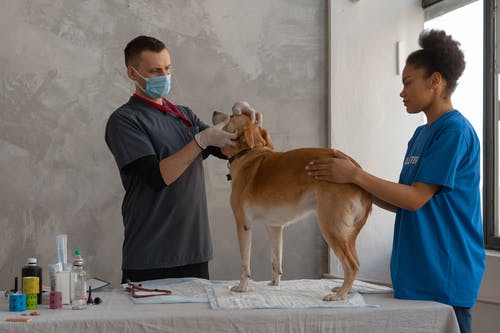What Can You Expect at Your Pet’s First Dental Surgery?

We can all attest to taking our pets to the vet for a basic check-up, but what about when it comes to dental surgery? The thought of your furry friend undergoing a surgical procedure can be daunting, but don’t let this discourage you from prioritizing your pet’s dental health. Let’s discuss what you can expect during your pet’s first dental surgery and, hopefully, answer some of your concerns.
What Is Dental Surgery?
Dental surgery, also known as oral or veterinary dental surgery in the context of pets, is a specialized branch of veterinary medicine that focuses on diagnosing and treating oral and dental conditions through surgical procedures. It involves various surgical interventions to correct dental abnormalities, address dental diseases, and improve the overall oral health of animals.
Dental Surgical Procedures
Dental surgery encompasses a wide range of procedures, including but not limited to:
- Tooth Extractions: Remove damaged or infected teeth that cannot be saved through other treatments like root canal therapy.
- Root Canal Therapy: A procedure to save a severely infected or damaged tooth by removing the diseased pulp, cleaning the root canal, and sealing it.
- Gum Surgery: Surgical treatments to address gum (periodontal disease), including deep cleaning (scaling and root planing) and gum tissue recontouring.
- Oral Tumor Removal: Surgical removal of benign or malignant tumors affecting the oral cavity.
- Jaw Fracture Repair: Fixation of fractured jawbones to allow proper healing and restore normal jaw function.
- Orthodontic Procedures: Surgical correction of dental malocclusions (misalignment of teeth or jaws) through crown reduction.
- Gingival Flap Surgery: Surgical procedures to access and clean deep pockets formed due to advanced gum disease.
- Dental Implants: Placement of artificial tooth roots (implants) to replace missing teeth and restore oral function.
- Treatment of Oral Trauma: Repair of injuries to the oral cavity, including lacerations and fractures.
- Feline Odontoclastic Resorptive Lesion (FORL) Treatment: Removal of damaged tooth structure in cats affected by FORL, a common dental condition.
In some circumstances, such as when your furry companion suffers from serious dental pain, you might require an emergency vet. Places like the animal hospital in Chino Hills, CA, provide 24/7 emergency veterinary services, a testament to the critical nature of prompt and accurate care.
Expectations of a Pet Dental Surgery
At your pet’s first dental surgery, you can expect a comprehensive and carefully orchestrated process to ensure your pet’s safety and optimal oral health. Here’s a list of what to expect:
1. Pre-Surgery Evaluation
- Dental Examination: The veterinary dentist or veterinarian will perform a thorough oral examination, evaluating the pet’s teeth, gums, and structures to identify dental issues and determine the appropriate surgical procedures.
- Diagnostic Tests: X-rays (dental radiographs) may be taken to assess the condition of tooth roots and supporting structures that are not visible to the naked eye.
- General Health Assessment: The pet’s overall health will be evaluated to ensure they are suitable candidates for anesthesia and surgery. Blood tests may be conducted to check organ function and identify underlying health concerns.
2. Anesthesia Consultation
- Anesthesia Protocol: The plan will be discussed with you, including the type of anesthesia used and any pre-anesthetic medications given.
- Anesthesia Risks and Monitoring: The veterinarian will explain the risks associated with anesthesia and the extensive monitoring protocols during the procedure to ensure your pet’s safety.
3. Pre-Surgery Instructions
- Withholding Food: You will be instructed to withhold food for a specific period before the surgery to reduce the risk of regurgitation during anesthesia.
- Hydration: Ensuring your pet remains adequately hydrated is essential, but water must be withheld briefly before the surgery.
4. Admission and Pre-Surgical Preparation
- Check-In: Upon arrival at the veterinary clinic or hospital, you will complete the necessary paperwork and discuss any last-minute concerns with the veterinary team.
- Pre-Surgical Preparation: The veterinary staff will place an intravenous (IV) catheter and administer pre-operative medications to prepare your pet for surgery.
5. Anesthesia Induction and Monitoring
- Anesthesia Induction: Your pet will be gently sedated and then intubated to maintain a secure airway during the procedure.
- Anesthesia Monitoring: Vital signs, such as heart rate, blood pressure, oxygen levels, and temperature, will be continuously monitored throughout the surgery.
6. Dental Surgery
- Surgical Procedures: Depending on the identified dental issues, the necessary surgical procedures, such as tooth extractions or root canal therapy, will be performed by a veterinary surgery expert.
- Pain Management: Appropriate pain relief will be administered during and after the surgery to ensure your pet’s comfort.
7. Post-Surgery Care
- Recovery and Observation: After the surgery, your pet will be moved to a warm, comfortable area to monitor during recovery closely.
- Post-Operative Pain Management: Pain medications may be prescribed to manage discomfort during recovery.
8. Post-Surgery Instructions
- Feeding Guidelines: You will receive instructions on when and what to feed your pet after the surgery.
- Home Care: The veterinary team will guide post-operative care, including wound care (if applicable) and administering medications.
9. Follow-Up Appointments
- Recheck Examinations: Follow-up appointments will be scheduled to monitor your pet’s healing progress and ensure they recover well.
10. Communication and Updates
- Communication with Pet Owners: The veterinary team will inform you of your pet’s progress and any significant findings during the surgery.
11. Post-Surgery Care Support
- Access to Veterinary Team: The veterinary team will be available to address any concerns or questions during the post-surgery recovery period.
Like humans, your pets need regular dental care to maintain optimal health. Delayed treatment often escalates minor dental issues into severe cases needing surgical intervention. Importantly, routine dental maintenance aids in the early detection of oral diseases, ensuring your pet lives a more comfortable, healthier, and longer life. Check this site: https://www.tlcanimalclinic.com/site/veterinary-services-chino-hills/dentistry for more information on veterinary dentistry.
Conclusion
Dental surgery is routine, and your pet is in safe hands with a professional and experienced veterinary team. While it may seem daunting, proper dental care can effectively prevent the need for such surgical interventions. Regular dental check-ups are your best defense against severe dental diseases and the cornerstone of a viable healthcare routine for your pet. Now that you know what to expect, you can march forward confidently when the time comes. After all, you want your pet to have the most healthy and happy years by your side.


